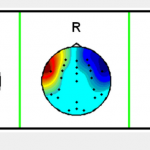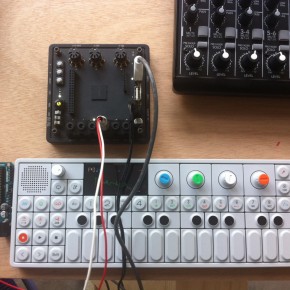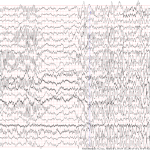
Brain-Computer Interface Based on Generation of Visual Images
This paper examines the task of recognizing EEG patterns that correspond to performing three mental tasks: relaxation and imagining of two types of pictures: faces and houses. The experiments were performed using two EEG headsets: BrainProducts ActiCap and Emotiv EPOC. The Emotiv headset becomes widely used in consumer BCI application allowing for conducting large-scale EEG...
David Rosenboom / Extended Musical Interface with the human nervous system
The original version of this monograph was written in 1989 and published in 1990. It’s purpose
was to document work that had taken place since the publication of my earlier book, Biofeedback
and the Arts, Results of Early Experiments in the mid-1970’s and the time of the original
publication of this monograph. Subsequently, after all copies of the...

Epoc a OSC
En este primer ejercicio, establecimos un sistema de comunicación utilizando el protocolo Open Sound Control entre la diadema de lecturas EEG Epoc de Emotiv con el software MindyourOSC.

La neurología del arte
La Neuroestética es una sub-disciplina relativamente reciente de la estética empírica que usa la neurociencia para intentar explicar y entender la experiencia estética a un nivel neurológico. Para lograrlo, hace un monitoreo activo del potencial de acción, también llamado impulso eléctrico: una onda de descarga eléctrica que viaja a lo largo de la membrana...
Aspectos técnicos del epoc
Electrode locations used by the EPOC Number of channels 14 (plus CMS/DRL references) Channel names (Int. 10-20 locations) AF3, AF4, F3, F4, F7, F8, FC5, FC6, P3 (CMS), P4 (DRL), P7, P8, T7, T8, O1, O2 Sampling method Sequential sampling, Single ADC Sampling rate ~128Hz (2048Hz internal) Resolution 16 bits (14 bits effective) 1...
Daniel J. Levitin / This is Your Brain on Music
Music’s evolutionary origin is established because it is present across all humans(meeting the biologists’ criterion of being widespread in a species); it has been around along time (refuting the notion that it is merely audio cheesecake); it involves specialized brain structures, including dedicated memory systems that can remain functional whenother memory systems fail (when a...

